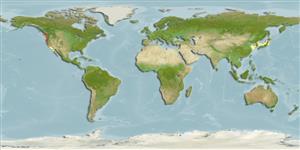Preferred temperature (Ref.
115969): 5.7 - 11.3, mean 7.6 (based on 24 cells).
Phylogenetic diversity index (Ref.
82804): PD
50 = 0.5625 [Uniqueness, from 0.5 = low to 2.0 = high].
Bayesian length-weight: a=0.00708 (0.00463 - 0.01083), b=3.11 (2.98 - 3.24), in cm Total Length, based on LWR estimates for this species & (Sub)family-body (Ref.
93245).
Trophic level (Ref.
69278): 3.7 ±0.1 se; based on diet studies.
Widerstandsfähigkeit (Ref.
120179): niedrig, Verdopplung der Population dauert 4,5 - 14 Jahre. (tm=1-3; Fec=72,000; tmax=27).
Prior r = 0.25, 95% CL = 0.16 - 0.37, Based on 1 stock assessment.
Fishing Vulnerability (Ref.
59153): Moderate to high vulnerability (45 of 100).
Climate Vulnerability (Ref.
125649): Low to moderate vulnerability (28 of 100).
